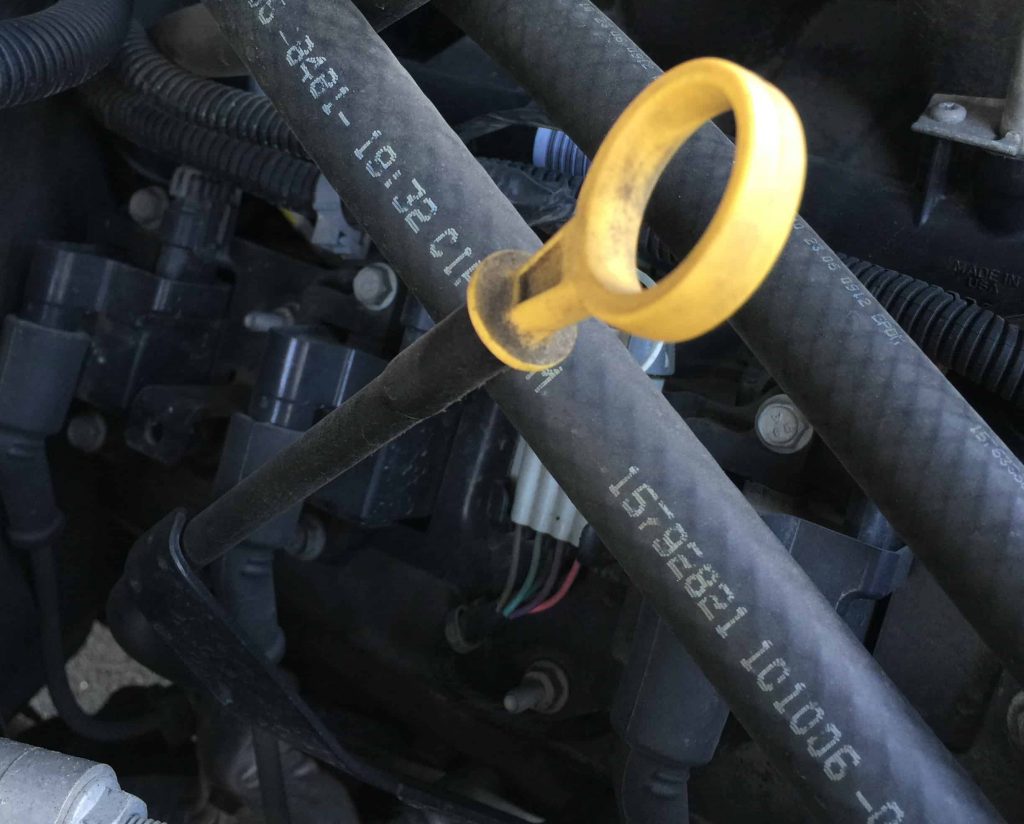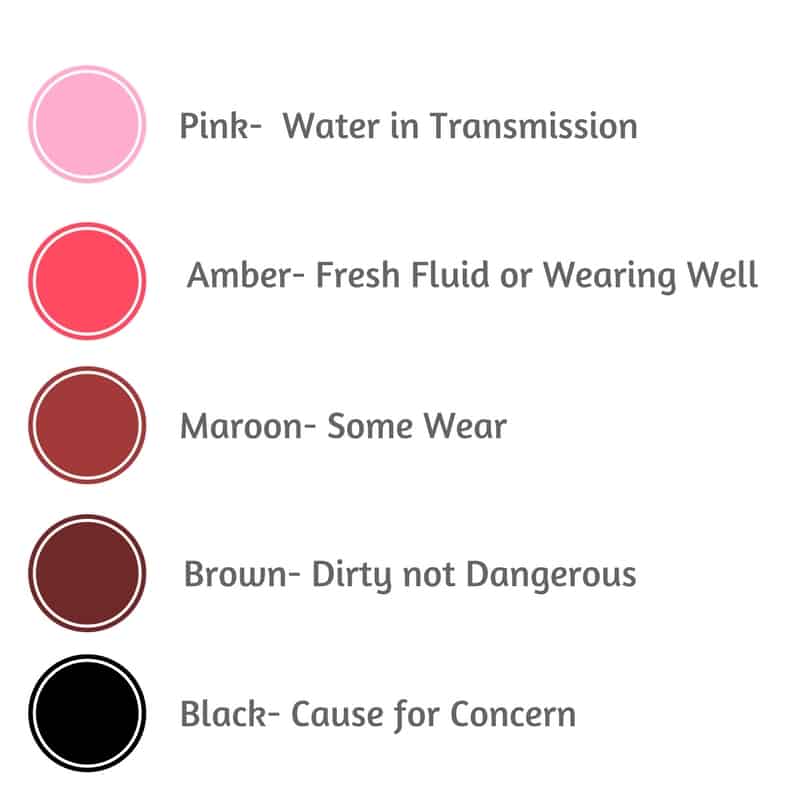
There are several symptoms to watch for that suggest your Challenger might have low transmission fluid. Some of these signs include irregular shifting, inability to shift, dashboard warning lights, slipping transmission, and strange noises coming from under the hood.
If you suspect that your Challenger has low transmission fluid, the first thing you should do is check the fluid level on a flat surface.
Understanding Automatic Transmission Fluid’s Job

Automatic transmission fluid (ATF) plays a crucial role in your Dodge Challenger’s transmission system. It serves several functions to ensure your vehicle runs smoothly and efficiently. Here are the primary jobs of ATF in your Challenger:
- Lubrication: The primary purpose of ATF is to lubricate the moving parts within your transmission. This reduces friction and prevents excessive wear on components.
- Cooling: The ATF helps to dissipate heat generated by the transmission’s operation. This prevents overheating and prolongs the life of your transmission.
- Hydraulic pressure: The ATF also acts as a hydraulic fluid, allowing the transmission to shift gears smoothly and effectively, as well as operate clutch systems.
- Cleaning: The fluid contains additives that help to clean and protect your transmission’s internal components, preventing buildup of contaminants and debris.
Signs of Low Transmission Fluid in the Dodge Challenger

It is important for you to be aware of the signs of low transmission fluid in your Dodge Challenger. Being able to identify these signs can help you maintain your car’s performance and avoid potential damages.
Slipping Transmission
One of the most common indicators of low transmission fluid is slipping during gear shifts. If your Challenger’s transmission changes gears with a noticeable delay or without a smooth transition, this could signal low fluid levels.
You may also experience sudden shifting, RPM spikes, and grinding noises while driving.
Delayed (or No) Gear Engagement
If you notice a pause of 2 to 3 seconds when shifting into Drive or Reverse, it is likely that there is not enough hydraulic pressure because of low transmission fluid.
This delay in gear engagement can negatively impact vehicle performance and require attention. If your Challenger doesn’t move in drive or reverse at all, the most likely reason is (very) low transmission fluid.
Irregular Shifts
Low transmission fluid in your Dodge Challenger can cause irregularities in your shifts. When there is an insufficient amount of fluid, gear changes might be inconsistent or unpredictable.
This can lead to a less comfortable driving experience and potentially lead to further transmission issues if not addressed in a timely manner.
Keep in mind that these signs could also point to other issues with your Challenger’s transmission, such as a bad torque converter.
Checking the transmission fluid is the first thing you should do when you suspect a transmission problem.
Unexpected Sounds

Grinding Noise
If you notice a grinding noise while driving your Dodge Challenger, it may be a sign of low transmission fluid levels. This noise usually occurs when the gears are shifting.
The lack of proper lubrication can cause gear teeth to grind against each other, resulting in an unpleasant sound and increased friction.
To prevent potential damage to your transmission, it’s essential to address this issue as soon as possible. Check your transmission fluid levels and replenish if needed.
Whining or Humming
Another sound you may encounter when facing low transmission fluid levels is a whining or humming noise.
This can happen when the transmission pump tries to circulate an insufficient amount of fluid, leading to increased friction and heat.
This combination creates a distinct noise that may be noticeable, especially during gear changes. To resolve this issue, ensure that your transmission fluid is maintained at an appropriate level.
Regularly check the fluid level and make sure to use the recommended transmission fluid for your Dodge Challenger to avoid any complications.
Physical Indications

In this section, we will discuss the physical indications of low automatic transmission fluid in your Dodge Challenger.
Pay attention to these signs to ensure your vehicle performs optimally and to prevent potential damage to your transmission system.
Leakage
One of the most apparent signs of low transmission fluid is a visible leak. If you notice a pool of red or brown liquid under your car, it’s likely that your transmission fluid is leaking.
This can occur due to damaged seals, gaskets, or a cracked transmission pan. Regularly inspect your parking spot or garage floor for any signs of leakage and address the issue promptly if detected.
Low Transmission Fluid
To check the transmission fluid level in your Dodge Challenger, you may need to use a dipstick or rely on the vehicle’s monitoring system, depending on the model. If your vehicle has a dipstick, locate it and follow these steps:
- Park your vehicle: Ensure it is on a level surface and the engine is turned off.
- Remove the dipstick: Clean it with a cloth or paper towel.
- Reinsert the dipstick: Fully reinsert the dipstick and then remove it again.
- Check the fluid level: The fluid level should be between the minimum (MIN) and maximum (MAX) marks on the dipstick.
If the level is below the minimum mark, it’s crucial to top up your transmission fluid as needed.
Color and Smell Changes

As you check the fluid level, also pay attention to the color and smell of the transmission fluid. Fresh fluid typically has a bright red color and a slightly sweet scent. Over time, the fluid may turn darker in color and develop a burnt odor, indicating that it needs to be replaced or there may be underlying issues with the transmission system. In such cases, consult a professional mechanic for further evaluation and action.
By being aware of these physical indications, you can maintain your Dodge Challenger’s transmission system and ensure your vehicle operates efficiently.
Vehicle Warning Lights

It’s important to keep an eye on your Challenger’s warning lights, as they can provide crucial information regarding your automatic transmission fluid. These warning lights are designed to alert you to any potential issues, including a low transmission fluid level, which can lead to various problems.
When your transmission fluid is low, you may notice your Challenger’s gears have trouble engaging or shifting.
This can be accompanied by dashboard warning lights, such as the check engine light or other transmission-related lights. However, some warning lights might be specific to your vehicle’s make or model, so it’s essential to consult your owner’s manual for detailed information on specific warnings and their meanings.
Additionally, with advancements in vehicle technology, some modern Dodge Challengers are equipped with an automatic transmission fluid life monitoring system, which can alert you when the fluid needs to be checked or replaced. This comes in the form of a warning light or message on your instrument cluster.
In case you notice any of these warning signs or lights on your dashboard, it is vital to address them immediately. Postponing a fix might cause severe transmission damage, which ultimately leads to costly repairs.
Remember to always refer to your Dodge Challenger owner’s manual for guidelines on proper maintenance intervals and procedures, as well as how to check your transmission fluid level. This will help you prevent issues related to low automatic transmission fluid and keep your vehicle running smoothly.
Conclusion
In order to maintain your Dodge Challenger and avoid potential damage, it’s essential to be aware of the signs of low automatic transmission fluid. Remember to regularly check your transmission fluid level to ensure optimal performance and prevent costly repairs.
One of the primary signs of low transmission fluid is a slipping transmission, where it may feel like gears are slipping during a change. This could result in sudden shifting, RPM spikes, and grinding noises.
Another symptom that you may notice is your vehicle’s poor overall performance. Your Dodge Challenger might struggle to accelerate, or you might experience jerky movements or uneven gear shifting.
Should you encounter any of these issues, it’s vital to take action immediately. Check the transmission fluid level and add fluid if necessary. Make sure it’s the correct type and viscosity recommended for your Dodge Challenger to avoid any further complications.
Frequently Asked Questions
What are common symptoms of low automatic transmission fluid in a Challenger?
If you notice your Dodge Challenger’s engine revving higher than it should be at any particular speed, it may be a symptom of low transmission fluid. Additionally, you might experience slipping gears, sudden shifting, RPM spikes, and grinding noises. These signs indicate that your transmission fluid levels might be low and require attention.
How can you determine if transmission fluid is low without a dipstick?
If your Challenger does not have a dipstick handle, you can still check the transmission fluid level. Locate the transmission fluid check valve on your vehicle and follow the recommended fluid level check or adjustment procedure for your specific model.
Consult your owner’s manual or a trusted professional for guidance on this process.
What are the consequences of driving on low transmission fluid?
Driving your Challenger with low transmission fluid can lead to several problems, including slipping gears, overheating, reduced fuel efficiency, and eventual failure of the transmission. If you suspect that your transmission fluid is low, it is essential to address the issue as soon as possible to prevent further damage and costly repairs to your vehicle.
How does bad automatic transmission fluid affect a Dodge Challenger?
Bad or contaminated automatic transmission fluid can cause adverse effects on your Dodge Challenger. When the fluid is not optimal, it can reduce the transmission’s ability to cool and lubricate its moving parts, leading to increased wear and tear. This can result in decreased performance, damage to internal components, and ultimately, transmission failure.
Are there any dashboard indicators for low transmission fluid levels?
There are no specific dashboard warning lights for low transmission fluid levels on a Dodge Challenger. However, you might notice warning lights for other issues, such as general transmission or engine malfunctions, which may be indirectly related to low fluid levels. It’s important to regularly check your transmission fluid to maintain optimal performance and prevent potential problems.

